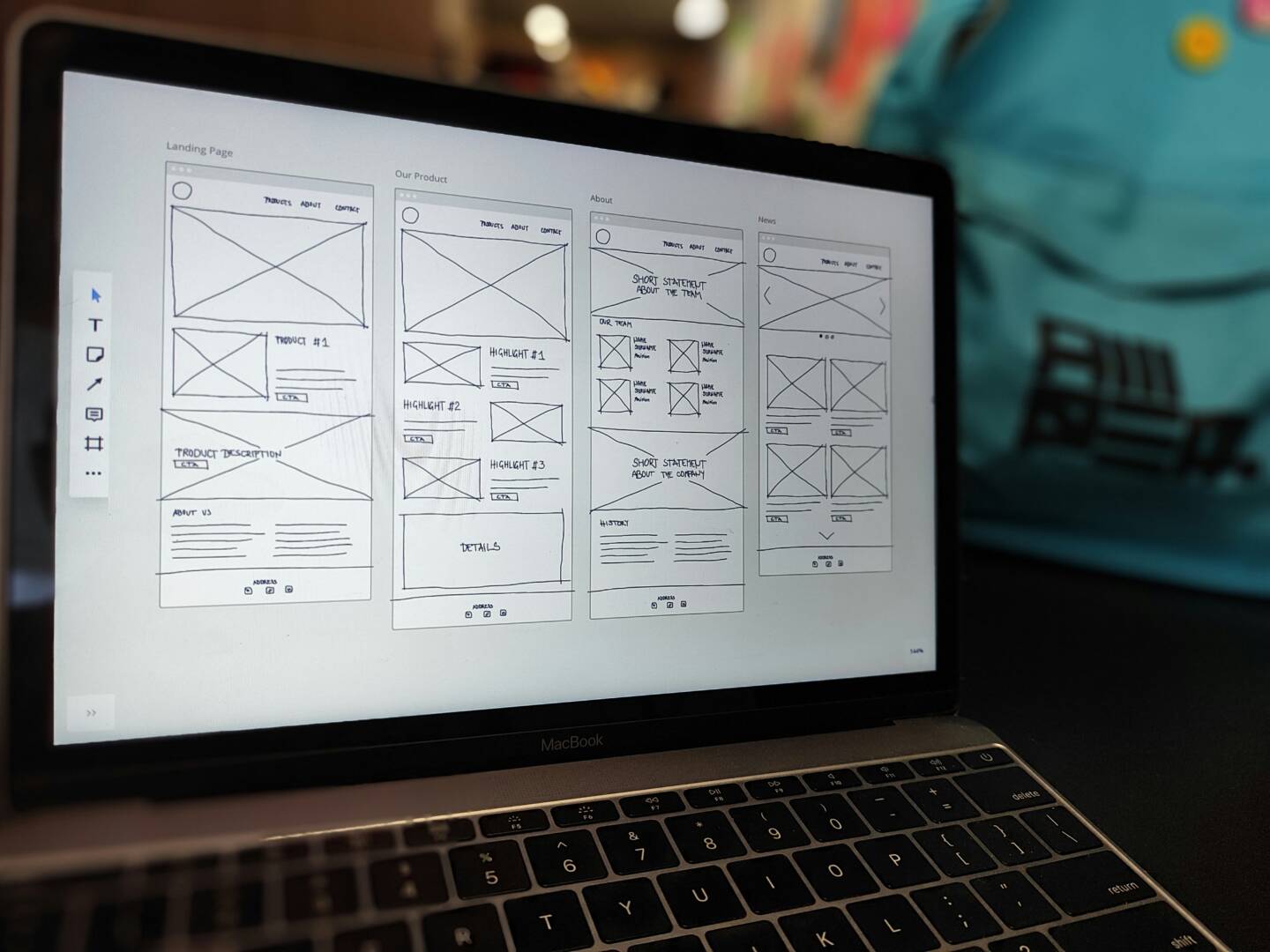
Który design jest lepszy? Czyli quizowe szaleństwo.
Jeśli bywasz w sieciach społecznościowych zapewniających przyzwoite zasięgi, typu LinkedIn czy Facebook, to na pewno natrafiłeś na publikacje swego rodzaju quizów, które można by nazwać „bitwą interfejsów”. O tym już wcześniej wspomniałem, ale dopiero po publikacji materiału dotarło do mnie, że temat jest wart szerszej analizy i ona właśnie znajduje się poniżej. Nie chce ci się czytać? Spoko! Posłuchaj artykułu w formie nagrania.
Bitwy interfejsów w social mediach – skąd ten trend?
Ogólna formuła owych quizów jest prosta. Zabawa polega na tym, że prezentuje się różne warianty projektu, będącego fragmentem czegoś większego. Zazwyczaj w formie porównania dwóch rozwiązań, z których żadne nie jest wyraźnie lepsze od drugiego, przynajmniej na pierwszy rzut oka. Z kolei pod spodem na te dwie opcje można zagłosować i zareagować ikonkami. Oczywiście podstawowe pytanie do obserwujących, to „który element jest według Ciebie lepszy”.
Zasięgi quizów i ich potencjał edukacyjny
Zasięgi oraz ilość reakcji pod materiałami tego rodzaju potrafią dać do myślenia. Spotkałem nawet przykłady osiągające ponad 20 000 odsłon i po kilka tysięcy samych reakcji.
Na początku stwierdziłem, że pomysł jest fajny. Szczególnie że łączy w sobie zabawę z edukacją. Bo ilu spośród biorących w niej udział zdawało sobie sprawę, że drobne fragmenty interfejsu, jak sposób prezentacji graficznej produktu, czy przycisk „dodaj do koszyka”, z którego na co dzień korzystają odruchowo, to efekt długich godzin pracy, poprawek, ocen, analiz i testów? Tak samo jest z większymi inicjatywami. Potocznie myśli się, że kiedy potrzebny jest na przykład sklep online, to wówczas przychodzi programista (a jeszcze potoczniej – informatyk), wykonuje podręcznikowy projekt graficzny, programuje, ustawia, publikuje i gotowe. W ten sposób wielu przedsiębiorców planujących sklep nie ma pojęcia, czego tak naprawdę oczekuje, co może zadziałać. I kończą z gotowym, oddanym i odebranym projektem, który rozczarowuje, bo nie sprzedaje. Z tego punktu widzenia pomysły z quizami warto pochwalić za propagowanie zdrowego, przemyślanego i świadomego podejścia do projektowania i pracy z projektantami.
Własne doświadczenie i fala krytyki
Wiedziony pozytywnymi intencjami, sam też dołączyłem do zabawy — opublikowałem własny quiz. Ale kiedy zabrałem się za czytanie pod nim komentarzy, zwróciłem uwagę na bardzo interesującą konstruktywną krytykę, za którą zawsze jestem wdzięczny.
Zarzuty pod wpisem dotyczyły nie tylko jego treści, ale także samego trendu quizów. Na przykład, że:
- nie da się fragmentów designu porównywać zero-jedynkowo,
- quizy reprezentują płytkie podejście do poważnego tematu wyboru elementów interfejsu,
- za tą modą kryje się banalny sposób na „farmy lajków” i zdobywanie zasięgu,
- autorom chodzi jedynie o własne ego.
Patrząc na trend, można w powyższych punktach zobaczyć sporo prawdy, choć z ostatnim raczej trudno się do końca zgodzić – tak daleko w ocenie intencji publikujących bym się nie posunął.
Jak łatwo zauważyć, celem quizów jest przede wszystkim dobra zabawa w mediach społecznościowych i bez cienia wątpliwości, budowanie zasięgów. Sam pomysł jest bardzo prosty i wtórny, przez co łatwo rozpoznawany i przystępny w odbiorze. Odbiorcy mają więc krótkie, szybkie posty dla zabicia czasu i mogą sprawdzić, ile osób ma podobne zdanie.
A jakie korzyści autorowi daje takie głosowanie?
Czy quizy naprawdę coś dają?
Łatwiej powiedzieć, czego nie daje. Moje zdanie mogłoby być rozwinięciem punktów widniejących powyżej. Społecznościowy quiz „na intuicję” nie jest sposobem na stwierdzenie, czy dany pomysł na design elementu jest lepszy, albo czy projekt lepiej wykonany. Takie oceny powinny uwzględniać nie wyrwany fragment, lecz pokazany jako część kontekstu, w którym gra z góry ustaloną rolę. Trzeba wziąć pod uwagę także sytuację sprzedażową: dla kogo dany design jest projektowany, jaki problem chcemy rozwiązać, jakie cechy ci konkretni ludzie docenią, … niezbędne pytania można mnożyć do takiego stopnia, że uwzględnienie ich w opisie psułoby całą zabawę.
Tymczasem spora część głosujących posuwa się do argumentowania swoich ocen w komentarzach, a nawet podpowiada, jak dany projekt zrobić lepiej. To oczywiście nie ma racji bytu, bo do merytorycznej dyskusji brakuje odpowiedzi na powyższe pytania. Samo głosowanie w społeczności nie prowadzi do wypracowania uniwersalnych rozwiązań, na które designerzy mogliby postawić stawkę projektu.
Rozdźwięk pomiędzy głosującymi i chaos w dyskusjach przesiąkniętych subiektywnymi odczuciami i gustami, także nie zachęca do poważnego traktowania wyników quizu.
Niektórzy potraktują dyskusję jak zabawę, inni bardzo osobiście a te podejścia nie zawsze jest łatwo od siebie odróżnić. Bezpieczniej zatem zaakceptować prawdę, że lekkość formy i rozrywka są w tym przypadku na pierwszym miejscu. Bonusem niech będzie możliwość uświadamiania internautów – częstokroć właścicieli firm lub innych osób decyzyjnych – na jakie rzeczy zwracać uwagę podczas projektowania interfejsu w działaniach internetowych.
Ryzyko uproszczeń i mylących wniosków
Brak sygnału, że quiz ma charakter rozrywkowy, oprócz niepotrzebnego wywoływania burzliwych dyskusji, stwarza także ryzyko zbudowania u części odbiorców przeświadczenia, że tak właśnie tworzy się strony, serwisy i sklepy – że są to głosowania podyktowane subiektywnymi odczuciami oceniających. Pamiętam, że jedna z osób w komentarzu pod wpisem zdradziła, że ktoś w jej otoczeniu rzucił na spotkaniu pomysł, aby zamienić kosztowne testy na quizy w LinkedIn i oprzeć późniejsze działania na kilku tysiącach subiektywnych reakcji. Jak zatem widać, funkcję społecznościową, mającą służyć rozrywce, naprawdę można podnieść do rangi profesjonalnych badań. Takie myślenie wiąże się jednak z olbrzymim ryzykiem. Na szczęście w mediach społecznościowych zwyczaje są takie, że pod szkodliwymi komentarzami częstokroć od razu pojawiają się tonujące zapał odpowiedzi, które sprowadzają na ziemię i tłumaczą, czym „pójście na skróty” może grozić. Mnie osobiście zawsze cieszą konstruktywne głosy i dyskusje obalające mity, bo jak widać, temat nadal jest gorący.
Jeśli spotykasz opisywane tu quizy, to ciekaw jestem, co na ich temat uważasz? Robią więcej szkody, niż pożytku? Jest w nich coś edukacyjnego? A może, wbrew pozorom, nie jest to tylko sztuczne podbijanie zasięgów? Chętnie poznam Twoją perspektywę.
Udostępnij


















